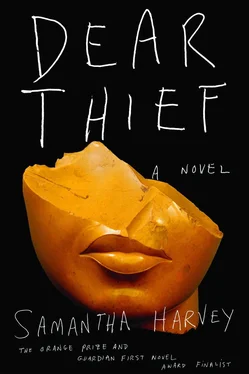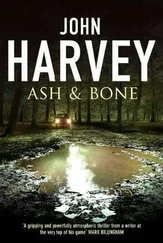Your last choice of postcard was exemplary, the chihuahua in the Tommy Cooper hat, and it warms me because I know why you chose it from whatever display carousel in whatever town you happened to be in. We watched Tommy Cooper die onstage in front of an audience who laughed because they thought it was part of the act, and though you never said it in so many words, I know you’ve felt this could be an analogy for your life. You were dying onstage in full view of everyone. This was the first thing I thought when I found your postcard to Teddy: she’s making a point, and the point is that she’s dying in such a way that everybody thinks she’s deep in the act of living. She is dying. She wants me to know, yet she doesn’t want me to take it seriously, at least no more seriously than you could take a chihuahua. No sooner does she make the cry for help than she lets loose the wry smile.
I see you pushing the half-written postcard to the side of the table and cooking up the mushrooms you foraged without the slightest idea of edibility. You pull the chair close to the table and take up your knife and fork with a serene hum. You eat with your back straight and your hair combed, in case it turns out to be your last supper.
As for me, most days I make an effort to do good. I flannel down withering bodies in baths and give insulin injections into bellies. I am asking a woman how it was to grow up during the war and, before she knows it, the needle has been in and come out again. Their poor bodies are pricked like dough with all the drugs in and the blood out. I help them get to their rooms to find a thing it turns out they never owned and which they wanted for a purpose they can’t remember, so we go slowly back to the chair from whence we came and say nothing of it. I spend much of the day taking people to the toilet, pulling down their underwear and waiting for the movement that was so urgent a minute before but which doesn’t come.
It’ll come when it’s ready, I say, which means nothing more or less than that. It isn’t to say it’ll come when we’re ready. Maybe we’ll have returned again to the chair and there won’t be time to get back to the toilet. What does it matter? We speak of dignity, but dignity is nothing more than being accepted. I feed them, I clear the food from their laps, I dab the spilt tea off their collars, I help them on with their nightclothes and out with their teeth, I snap the lids off their vials, I see past their rages, and furthermore they let me. The pay is abysmal and it isn’t true that job satisfaction, as such, makes up for it. It isn’t like a hospice that aids people as restfully as possible towards death, but more like an alpine crevasse in which people hang as desperately as possible onto life, and increasingly one they don’t even want. There isn’t any satisfaction in supporting the insupportable. For me, the satisfaction comes from somewhere else. One day I lifted the loose flesh of an old woman’s breast so I could wash underneath and I passed no judgement. I used to think: Why does it come to this? Why do we suffer? Why can’t you piss now that we’re here in the place people piss, rather than piss over there? If you pissed in the right place there’d be no pads, no rubber sheets. Why must our breasts collapse? Why must our teeth come loose?
I lifted that flaccid breast and all I thought was: Oh well, breast gone to the dogs. When I looked up at the woman’s face I saw a person who had borne the brunt of a joke, and without thinking I squeezed her hand and laughed. She looked down at her chest and began to laugh too, and as I carried on washing her neck, shoulders and arms the laughter died down into smiles that were so full of the shared joke that each time we caught one another’s eye we started up again.
What is it to be acceptable? Isn’t it just for somebody to accept us? The thought comes: Why can’t you feed yourself? Why does it come to this? Then the better thought comes: I accept you. But acceptance takes so much effort; am I really equal to the task? If I am asked to do overtime at work I refuse, because too long there makes you brutal. Sometimes I can feel it myself when I start seeing the place as an opportunity to scrape together a little more money and then realise in bitterness that the exhausting toil of it isn’t worth the money scraped. I take it out on the bodies that generate the never-ending toil by being a little less gentle, a little less patient, a little more coercive, and then I hate them for being so easily coerced.
I always wanted a gentle nature. I was over forty by the time I realised I was not going to develop one. My father had one, my mother too underneath the effusive spirit, which meant that it was in my genes and that there would be an onset at some point in life — a sudden, incurable onset of gentleness. The day it struck me that this wasn’t going to be the case was the day I saw Teddy being the diplomat, just like my father. I’d gone to pick him up after a night at the cinema and when I pulled up he was walking over to a group of men fighting. I watched him, a sixteen-year-old, extend his arms between the two factions and part them like curtains, without force or threat. Nobody would touch Teddy, he was dovelike; my father would have done just the same in that situation with the same effect, not only calming violence but converting violence into calm.
I know now that the gentle gene skipped a generation. It had come to Teddy by adolescence and most likely long before that. I heard you say, ‘If a thing you want isn’t coming by nature, then you must make it come by design; if you can’t design it either, spoof it.’ With this in mind I applied for the job at a care home just off the Finchley Road, up near Swiss Cottage — The Willows it’s called, and I do not (am I too serious?) join the others in calling it The Wallows. At work I do gentle things and through them I feel more like my father and Teddy. In feeling more like them I act more like them, and then feel more like them; the circle is virtuous as far as it goes. I hear stories that repeat on ten-minute loops, I pluck the hairs from a woman’s chin, I put dressings on a man’s bedsores, I hold the hand of a ninety-year-old screaming at her bowl of stewed rhubarb and look patiently into the back of her mouth at the vibrating uvula. I shrug as I remove the bowl. ‘I don’t like rhubarb much, either,’ I say. I put a steady hand against her cheek, against all their cheeks. It’s alright, I tell them. I don’t mean it is going to be alright, I mean it is now, already, so long as it can be accepted.
Happiness doesn’t come in the way I expected; not a massing of good things over time, but a succession of small, strange and unowned moments — the sun makes a hot oblong on the bedroom floor and I stand in it with my eyes closed. The coriander germinates in the window box and up comes the seedling. The bled radiators stop knocking at night. Just after the first bar of Coltrane’s ‘Naima’ I’m reminded of ‘Ruby, My Dear’ and at the end of ‘Ruby, My Dear’ I’m reminded suddenly of Nina Simone’s ‘Sinnerman’. New connections! As if the world’s hands are joined. I spent over half my life waiting for the accumulation of happiness and then I realised that it doesn’t accumulate at all, it just occurs here and there, like snow that falls and never settles. Not the drifts that you and I imagined we would plough ourselves into, but instead gently, opportunistically, holding one’s tongue out to catch the flakes.
Anyway, this morning when I caught my reflection getting out of bed, I was young; it must have been something to do with the movement, the transition that made me look it. I got dressed without looking again. Late morning I went out to meet Ruth, whom I know you’ll remember because she delighted you; a paediatrician, you’d said with a nod when I told you. ‘Oh, to be a sick child and be in Ruth’s hands,’ you said. ‘Doesn’t she make you feel comforted somehow, as if humankind is working? As if all the old loose ends are now accounted for?’
Читать дальше












